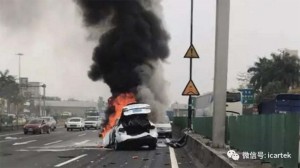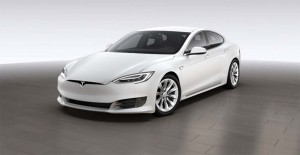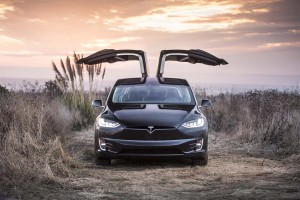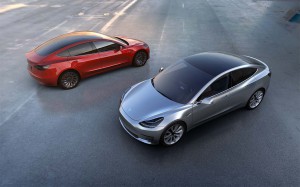The influential Consumer Reports magazine has again downgraded Tesla’s Model S sedan, this time due to a lack of an important safety feature that was supposed to be included as standard equipment.
CR has downgraded Tesla products on several occasions, though past moves focused on quality concerns. This time, the magazine said, the Model S produced over the last six months did not have a working emergency auto-braking, or AEB, system, apparently because of a problem with software that was supposed to control an updated version of the AEB hardware introduced in October 2016.
It’s the latest in a series of problems involving Tesla’s high-tech safety technology. Last week, Tesla was hit with a lawsuit claiming that its optional, semi-autonomous Autopilot system is “unusable and demonstrably dangerous.” Days later, the battery-carmaker announced a recall covering a parking brake problem affecting 53,000 vehicles.
Tesla models produced before last October were equipped with AEB technology, Consumer Reports noted. And both the Models S and X were supposed to retain that feature but use a replacement system based on entirely new hardware and software. The upgrade was spurred by a May 2016 crash of a Tesla Model S sedan that resulted in the death of a former Navy SEAL on a Florida highway. The new system relies solely on radar, eliminating the camera found in older Tesla vehicles
But Tesla has reportedly faced problems with software designed to operate its new technology – including features like Autopilot, as well as emergency auto-braking – and has not activated those systems on some of its vehicles.
“When we purchased our latest test car, we were assured automatic emergency braking would be enabled by the end of 2016,” said Jake Fisher, director of Consumer Reports’ Auto Test Center.”We’ve been waiting for this important safety feature, which is standard equipment on much cheaper cars.”
The carmaker has indicated it now has a fix and this week began to use an over-the-air, or OTA, system to upload the new software to vehicles built since last October.
According to CR, the updates could take up to two weeks before the technology is activated in all of those newer Tesla models. The magazine has not indicated whether it will then consider upgrading Tesla products.
Tesla has not yet responded to a request for comment from TheDetroitBureau.com.
For now, the Model S has slipped from first to third among CR’s ultra-luxury models, behind the Lexus LS and BMW 7-Series. Both of those imports include AEB as a standard feature.

Passengers struggled to escape from this Tesla Model X when its Falcon Doors failed to open following a February crash and fire in China.
Consumer Reports has had something of a love/hate relationship with Tesla. In mid-2015 it reported that the Model S was the best vehicle it had ever tested. But months later, citing endemic quality problems, the magazine removed the sedan’s coveted “Recommended Buy” rating. It was restored last year as quality improved. But CR then downgraded the newer Model X battery SUV because of even worse quality issues, including its problem-plagued Falcon Wing doors.
Earlier this week, reports surfaced about a Model X owner in China, along with a passenger, who had to be rescued from their vehicle when its battery pack caught fire and the Falcon Wing doors wouldn’t open following a crash.
Separately, three Tesla owners last week filed suit in federal court alleging the Autopilot system is “unusable” and “dangerous.”
(Why is Tesla being sued? Click Here for the full story.)
“When consumers received these pricey vehicles, it became clear that Tesla’s marketing was all smoke and mirrors,” said Steve Berman, managing partner of Seattle’s Hagens Berman, which has been an aggressive practitioner of plaintiff law in recent auto safety cases. “And Tesla knew when it made these promises that it didn’t have the capabilities to follow through on its deal. It knowingly deceived tens of thousands who put their faith in these cars and in Tesla.”
This week also saw Tesla recall 53,000 Model S sedans and Model X SUVs due to a potential manufacturing problem that could cause their parking brakes to malfunction. The affected models were assembled between February and October 2016, and accounted for more than half of the automaker’s total production last year.
(For more on the Tesla recall, Click Here.)
Whether the Consumer Reports announcement will have much of an impact remains to be seen. Other recent developments have done little to worry investors, however, Tesla stock climbing to yet another record on Wednesday at $313.98 a share.
The company has set a series of new highs in recent weeks – its market capitalization surging past that of both General Motors and Ford Motor Co. in the process – despite a variety of challenges and concerns. Among the potential headaches: the threat of a strike that could impact the upcoming launch of the critical new Model 3 sedan.
That battery-car is expected to go into production in July and, if it meets the target set by Tesla CEO Elon Musk, could see the carmaker’s sales surge almost five-fold by 2018, to 500,000 vehicles.
(Tesla CEO Musk personally intervenes to head off strike. Click Here for the latest.)



